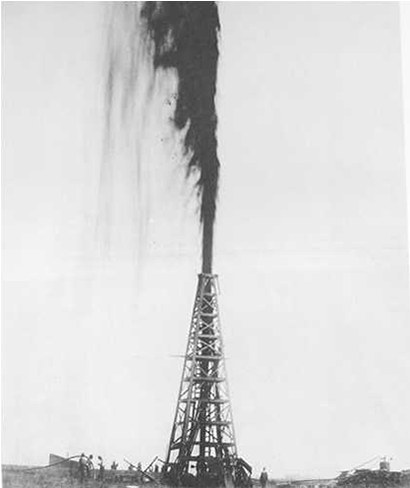
The Lucas Gusher at Spindletop Hill, Jan 10, 1901
[Source: The American Petroleum Institute & PRI]
One of the pivotal drilling attempts occurred at the turn of the century in - you guessed it - Texas. The particular location was on a hilltop called Spindle Top, located near Beaumont, Texas, and the find opened up the vast oil reserves below the Texas soil.
You can read more about those early days in the Hand book of Natural Gas by Henry Palmer Wescott (Yay, Google books!).
So why am I bringing all this up? Perhaps not ironically, this early find started with a bit of an oil spill - nothing like the current disaster in the Gulf of Mexico, but it still caught my attention as an example of the real challenges we still face tapping these deep, pressurized pockets of crude.
While I'm poking around in historical documents, here's part of a newspaper article published in the Houston Daily Post shortly after the find on January 11, 1901.
OIL STRUCK NEAR BEAUMONT.
A Stream of Petroleum Shot Into the Air for a Hundred Feet.
Prospector Who Has Been at Work for Two Years
Has His Faith Rewarded -- The Flow Is Esti-
mated at 5000 Barrels Per Day.
Beaumont, Texas. January 10.--Beaumont is excited tonight and it has good reason to be. About three mils south of the city there is spouting an oil well the equal of which can not be seen elsewhere in the United States and probably in the world.
Captaion A. F. Lucas, a geologist of Washington, D. C., made the lucky strike. The captain has been prospecting in the vicinity of Beaumount for more than two years. He has spent thousands of dollars with indifferent results until this morning, when the inside pipe in a hole in which he was operating blew high into the air, and it was followed by a six-inch stream of oil, which spouts nearly fifty feet higher than the sixtey-foot derrick.
...
The post correspondent visited Captain Lucas this afternoon, but that gentleman was so happy over his strike that he would not talk. He merely hugged the reporter and pointing to oil as it sailed high into the air, said: "Its equal can not be seen on this earth." Under existing conditions there is no way of estimating the flow of oil, but Captain Lucas says 5000 barrels per day would be exceedingly low...
By today's standards, it would indeed be exceedingly low, but at the time - that was quite a gusher! That well spewed oil for a few days before it was finally brought under control (if I can trust my recollection of what I heard on the History Channel...). While I doubt it got any bad press at the time - for better or worse - it went on to help fuel the last century of the modern industrial era.





0 comments:
Post a Comment